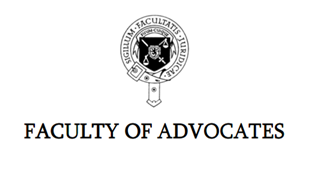Dean‘s open letter to PM and Home Secretary
08 Oct
THE Dean of Faculty has made a personal plea to the Prime Minister and the Home Secretary: Stop denigrating the legal profession.
Mr Dunlop has written to Boris Johnson and Priti Patel following speeches in recent days in which references were made to “lefty human rights lawyers and other do-gooders”.
In his letter, Mr Dunlop said that lawyers who acted against the state were simply doing their professional duty. He noted that, fortunately, instances of violence against lawyers were rare in the UK, unlike in other countries.
“However, in a climate of increasing populism, this sort of rhetoric is not only facile and offensive, it is potentially harmful. With great power comes great responsibility, and I have to say – with great respect – that I simply cannot fathom why it is thought in any way appropriate to attempt to vilify, in public, those that are simply doing their job, in accordance with the rule of law,” said Mr Dunlop.
“I would accordingly, and again with great respect, ask each of you to eschew such unhelpful language, and to recognise that challenges to the executive are a necessary part of our democracy. Anything less would be a confession that we no longer live in a democracy.”
The letter:

8 October 2020
The Rt. Hon. Boris Johnson M.P.
The Prime Minister
10 Downing Street
SW1A 2AA
Dear Prime Minister
As I hope you know, the Faculty of Advocates represents the Scottish Bar. All Advocates qualified to practise before the Scottish Courts are Members of Faculty. All are bound by the cab rank rule. This was explained thus by one of my predecessors as Dean of Faculty, John Inglis, latterly Lord President of the Court of Session, in Batchelor v. Pattison & Mackersy (1876) 3 R. 914, 918:
“An Advocate in undertaking the conduct of a cause in this Court enters into no contract with his client, but takes on himself an office in the performance of which he owes a duty, not to his client only, but also to the Court, to the members of his own profession, and to the public. From this it follows that he is not at liberty to decline, except in very special circumstances, to act for any litigant who applies for his advice and aid, and that he is bound in any cause that comes into Court to take the retainer of the party who first applies to him… Another result is, that while the client may get rid of his counsel whenever he pleases, and employ another, it is by no means easy for a counsel to get rid of his client. On the other hand, the nature of the Advocate’s office makes it clear that in the performance of his duty he must be entirely independent, and act according to his own discretion and judgment in the conduct of the cause for his client.”
Against that backdrop, I require to intimate, as Dean of Faculty and on behalf of all Members of Faculty, that I deprecate the recent pronouncements - from the Home Office, then from the Home Secretary, and latterly from the Prime Minister himself - to the effect that there is a problem with “lefty lawyers” or “activist lawyers” who are “hamstringing” the justice system. Whether the topic is immigration, or crime, or the constitution, lawyers that act against the State are not being “lefty”, nor “activist”: they are doing their professional duty. It is simply unconscionable for Her Majesty’s Government to decry in this way the actions of professionals who, as the comments of Lord President Inglis make clear, are not at liberty to do otherwise.
In this country (and the same cannot be said of all countries), instances of violence against lawyers are, fortunately, rare. However, in a climate of increasing populism, this sort of rhetoric is not only facile and offensive: it is potentially harmful. With great power comes great responsibility, and I have to say – with great respect – that I simply cannot fathom why it is thought in any way appropriate to attempt to vilify, in public, those that are simply doing their job, in accordance with the rule of law. I would accordingly, and again with great respect, ask each of you to eschew such unhelpful language, and to recognise that challenges to the executive are a necessary part of our democracy. Anything less would be a confession that we no longer live in a democracy.
R.W. Dunlop Q.C.
Dean of Faculty
ADVOCATES LIBRARY PARLIAMENT HOUSE EDINBURGH EH1 1RF
www.advocates.org.uk